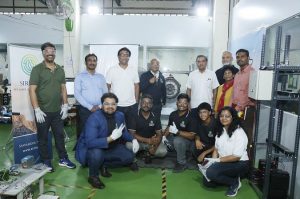SiriNor, a deeptech aerospace startup based in India and Norway, has successfully completed the on-ground test of its all-electric jet engine in Pune, marking a key milestone for the future of clean aviation.
The test, which achieved Technology Readiness Level 6 (TRL-6) under NASA’s framework, proved that SiriNor’s proprietary engine can deliver both the performance and scalability needed for commercial use. The engine exceeded its design targets, reaching over 40,000 RPM and delivering 10 kgf of thrust, demonstrating its readiness for commercial development and real-world applications.
SiriNor is addressing a jet engine market projected to exceed USD 100 billion by 2030, at a time when aviation emissions and costs are under growing scrutiny. With a power-agnostic designcompatible with both batteries and hydrogen fuel cells, the electric jet engine is built for application across drones, unmanned aerial vehicles (UAVs) to regional aircraft and seaplanes, targeting both civilian and defence markets.
Approaching commercialisation in a phased manner, SiriNor will integrate its engine with UAVs, targeting rollout by mid-2026. Building on this foundation, SiriNor will expand to seaplanes and ground-effect vehicles, aiming for certification and market entry in 2027. The final phase focuses on scaling up for regional and civil aircraft, with integration and certification planned for 2030. This staged process allows SiriNor to validate its technology, gain operational experience, and accelerate adoption—starting with drones and scaling to mainstream, zero-emission flight across the aviation sector.
SiriNor has already attracted early-stage investment from Shell E4, DCM Shriram, and several prominent angels, and has secured a valuation exceeding USD 20 million. The company is preparing to raise another USD 5 million in 2025 to accelerate commercialization. Seven Letters of Intent (LOIs) have been signed with global partners in the UAV, ground-effect vehicle, and small aircraft sectors.SiriNor has also already signed an MoU with Genser Aerospace earlier in 2025 to integrate its electric jet engine into Genser’s Light Business Programme.

“We had the fortune of meeting Abhijeet at a startup conference and were deeply impressed by his passion and commitment to building a sustainable electric jet engine. After hearing Abhijeet’s pitch, it was clear to me that this was serious, homegrown technology being developed right here in India. I truly believe this represents the future of aviation, and I’m proud to be part of this journey,” said Alok B Shriram, CEO, DCM Shriram Industries Ltd.
By eliminating combustion and the need for exotic materials, theSiriNorengine cuts manufacturing costs by 30 percent and reduces maintenance by 40 percent. The flexible engine architecture lowers barriers to adoption, enables easier retrofitting, and is highly relevant for both emerging and established aviation manufacturers.
“This ground test is not just a technical milestone. It’s a moment of validation for our amazing team and our common vision. I’m incredibly proud of our team, who have dedicated five relentless years to reaching this point. Their hard work, perseverance, and never-say-die attitude made this achievement possible. TRL6 is a result of their hard work and a testament to their belief in our mission,” said Ivar Aune, Chairman & CEO, SiriNor.
Abhijeet Inamdar, Co-founder and CEO, SiriNor India, added, “Our engine architecture is designed for flexibility at its core, enabling us to usher in a new era of emission-free, electrified aviation. I’m proud to be part of this transformative journey and to contribute meaningfully to the Make-in-India mission.”
*Disclaimer:
The electric jet engine has completed laboratory testing at Technology Readiness Level 6 (TRL6) under controlled conditions. Some figures and projections shared are based on assumptions regarding current market conditions and supply chain constructs. These results are preliminary and subject to further validation through real-world testing and regulatory review.